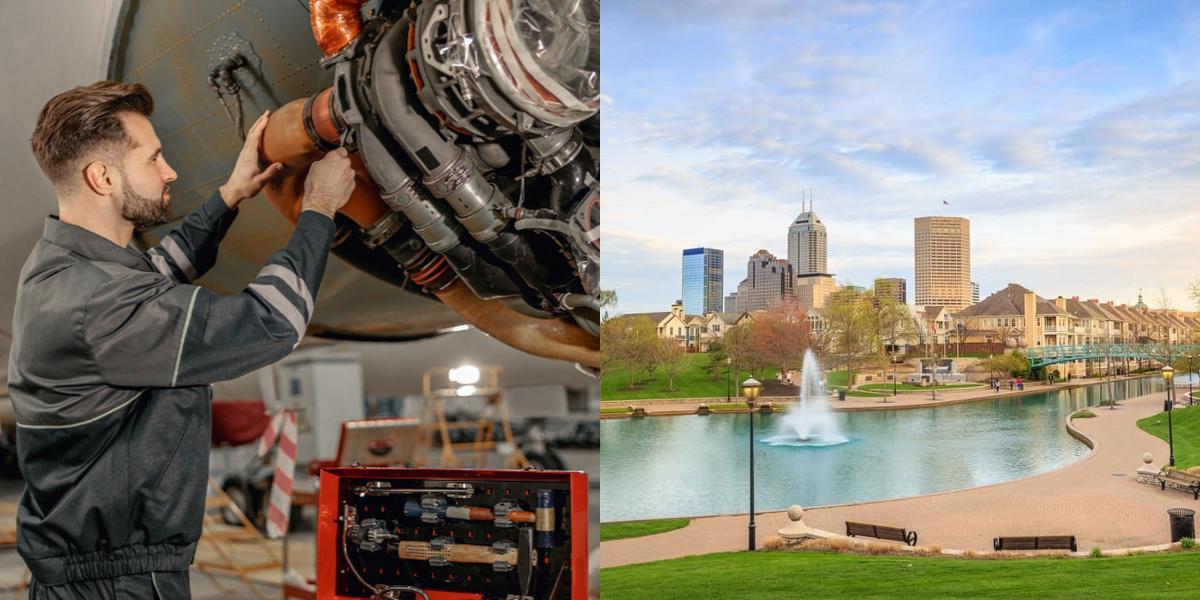How to Become an Aviation Mechanic in Indiana

Aviation mechanics, also known as aircraft mechanics or aviation technicians, are professionals who are responsible for inspecting, repairing, and maintaining aircraft to ensure their safety and proper functioning. Their main goal is to prevent mechanical failures and keep aircraft in optimal condition.
3. Search for Job Openings
Utilize online job boards, aviation-specific job websites, and company websites to search for job openings. Keep an eye out for positions at airlines, maintenance and repair organizations (MROs), and general aviation facilities. Consider applying for entry-level positions to gain experience and work your way up in the industry.
4. Prepare for Interviews
Before attending interviews, research the company and familiarize yourself with their operations, fleet, and safety practices. Prepare answers to common interview questions related to your experience, skills, and knowledge as an Aviation Mechanic. Highlight your ability to work well in a team, follow procedures, and troubleshoot problems.
5. Obtain Additional Certifications
To stand out from other applicants, consider obtaining additional certifications related to your specialization or other areas of aviation maintenance. These certifications can demonstrate your commitment to professional development and make you a more competitive candidate.
6. Stay Updated on Industry Trends
The aviation industry is constantly evolving, and it is important to stay updated on the latest trends, technologies, and regulations. Attend industry conferences, participate in webinars, and read industry publications to stay informed. Being knowledgeable about industry changes can make you a valuable asset to potential employers.
Career Paths and Opportunities after Becoming an Aviation Mechanic
Becoming a certified Aviation Mechanic opens up a wide range of career paths and opportunities within the aviation industry. Here are some potential career paths you can consider:
1. Airline Maintenance Technician
Many Aviation Mechanics find employment with airlines, where they are responsible for inspecting, maintaining, and repairing aircraft in the airline's fleet. Airline maintenance technicians work in hangars and maintenance facilities, ensuring that aircraft are safe and in compliance with FAA regulations.
2. General Aviation Mechanic
General aviation refers to all aviation activities that are not part of commercial or military operations. General Aviation Mechanics work on a variety of aircraft, including private jets, helicopters, and small planes. This career path offers opportunities to work in smaller, specialized maintenance facilities or as part of a private aircraft owner's maintenance team.
3. Corporate Aviation Technician
Corporate aviation technicians work on aircraft owned by corporations and businesses. These aircraft are typically used for business travel and can range from small jets to larger, long-range aircraft. This career path may involve working directly for a company or being employed by a maintenance service provider that specializes in corporate aviation.
4. MRO Technician
MRO stands for Maintenance, Repair, and Overhaul. MRO facilities are responsible for performing maintenance and repairs on aircraft from various airlines and operators. Working as an MRO technician can provide exposure to a wide range of aircraft types and the opportunity to work on complex maintenance tasks.
5. Aircraft Inspector
Aircraft inspectors are responsible for conducting thorough inspections of aircraft to ensure they are in compliance with FAA regulations. Inspections can include visual inspections, non-destructive testing, and record reviews. This career path requires attention to detail, knowledge of aircraft systems, and a strong understanding of FAA regulations.
6. Quality Control/Quality Assurance
Quality control and quality assurance professionals are responsible for ensuring that all maintenance and repair work meets the highest standards of safety and quality. These roles involve conducting audits, implementing quality control procedures, and providing guidance to technicians. This career path requires a strong understanding of aviation maintenance practices and regulatory requirements.
Final Thoughts
Becoming a certified Aviation Mechanic requires a combination of education, training, and practical experience. By following the steps outlined in this article, you can obtain your certification and start a rewarding career in the aviation industry. Remember to continuously update your skills, stay informed about industry trends, and network with professionals in the field to maximize your job prospects. Whether you choose to work for an airline, in general aviation, or as an inspector, the aviation industry offers numerous opportunities for growth and advancement.
Looking for a better fit? These other articles could be more in line with your expectations if this one isn't precisely what you had in mind:

Sunshine is a member of the School Growth team at Dreambound, where she assists students and schools with their billing and onboarding needs. She is a licensed mechanical engineer. Outside of work, she enjoys road trips with her family, discovering cozy cafes, and exploring her love for art.





